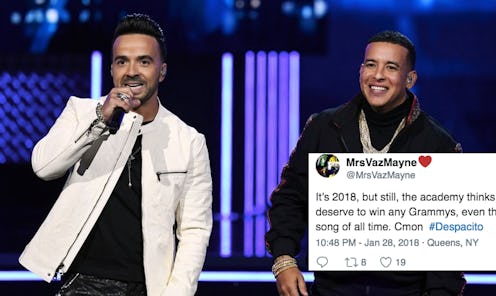Entertainment
"Despacito” Won Zero Grammys & Fans Argue Latin Music Isn't Getting The Recognition It Deserves

At the 60th Annual Grammy Awards on Sunday, one of summer's biggest hit songs, "Despacito," didn't win any Grammys — and some people on social media found it more than just disappointing. The Spanish-language song, performed by singer Luis Fonsi and rapper Daddy Yankee and featuring Justin Bieber, would have been the first non-English language composition to win the "Song of the Year" title since 1959, had it been selected. The 2018 award ultimately went to Bruno Mars' "That's What I Like"; however, some people felt that "Despacito" was slighted — and that the music industry needs to do more to support Latin music.
"Despacito" was nominated for three Grammy awards: Record of the Year, Song of the Year, and Best Pop Duo/Group Performance. "Despacito" was wildly popular in 2017. According to the Los Angeles Times in an article published prior to the Grammy Awards, the song spent 34 weeks on Billboard's Hot 100 List and 16 weeks at the top of the list — tying the record for the longest time a song has ever remained at number one. Moreover, the song's video (for the original version, which did not feature Bieber) became the most viewed YouTube clip of all time. It currently has 4.7 billion views and was released a mere year ago.
As an article in Forbes pointed out, the reach of "Despacito" is global in nature. The song's music video is the most-watched in over 50 countries worldwide and the song itself is the most streamed song of all time.
Considering the song's popularity, some people on social media were shocked that it failed to take home any Grammy awards. As previously mentioned, the Song of the Year award went to Mars' "That's What I Like," while record of the year went to Mars' "24K Gold" and Best Pop Duo/Group Performance went to Portugal The Man for "Feel It Still".
While acknowledging the merits and skills of the artists and songs that received awards, some people also expressed disappointment that a song that was so prolific did not secure a victory. Others indicated that they believe more needs to be done to recognize Latin music.
Indeed, one Twitter user expressed her support for Mars but shock at the ultimate award decision, saying, "I love Bruno but that award should’ve gone to #Despacito and I know that it didn’t win just cuz the academy didn’t want a Spanish song to win. Despacito was THE MOST PLAYED SONG OF ALL TIME. How can you ignore this n give it to a song in English."
Fans' reactions to "Despacito's" apparent snub are supported by the notion that Latin artists and, particularly, Spanish-language songs, tend to be quite under-represented at the Grammys, especially in what are considered the major award categories. Indeed, as Billboard wrote back in November of last year, the last time "remotely Latin" songs were nominated in main Grammy categories was in 2000, when Santana's "Smooth" and Ricky Martin’s "Livin' La Vida Loca" were both up for Song of the Year and Best Pop Duo/Group ("Smooth" won both Grammys). Notably, both of these songs are predominately in English, unlike "Despacito." Thus, a Grammy for "Despacito" would have certainly constituted a historic victory.
Another user further speculated as to why "Despacito" may not have been awarded a Grammy, despite its record-breaking success, tweeting, "Despacito was the TRUE Record of the Year. 5 billion views on YouTube, most streamed song in history. Record of the DECADE.But they didn’t win tonight. Why? I bet they don’t have a single Spanish-speaking voter in the pool of Grammy judges."
Several others users joked that they knew how pervasive "Despacito's" influence had been because it helped them to start learning Spanish as they listened to the song over and over again. Again, they were shocked that the song failed to secure an award, considering its popularity.
Overall, it is quite clear that many fans felt that "Despacito" had been denied a Grammys victory it deserved after many months of record-breaking success. And those fans will probably be closely watching to see if and how the Recording Academy, which votes on Grammy nominations and ultimately decides award winners, responds to this criticism.